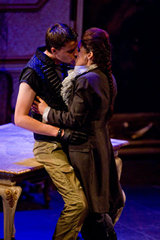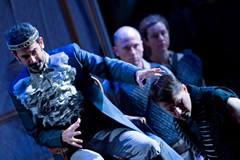| Opera Reviews | 2 May 2024 |
| Richly
rewarding by Sarah Noble |
|
| Charpentier: David et Jonathas Pinchgut Opera City Recital Hall, Sydney 3 December 2008 |
|
|
Charpentier's opera draws its story from the Old Testament, recounting the passionate friendship between David and Jonathan during the war between the Israelites (led by Jonathan's father, Saul) and the Philistines. When a prophecy warns Saul that he and his son will be killed and that David will take his throne, Saul banishes David. David joins with the Philistines and a truce is soon arranged. But the scheming Philistine general, Joabel, sows further seeds of suspicion in the mind of Saul, and the latter pursues his destructive scheme. In the ensuing battle, Jonathan is killed. An enraged Saul stabs himself and dies cursing David. A joyful chorus welcomes David as the new King, but their rejoicing falls on deaf ears: David is left utterly bereft by the death of his beloved Jonathan. Rader-Schieber's production sets the action in a crumbling, army-occupied art gallery where Caravaggio's David with the Head of Goliath looms large. Saul and Jonathan's costumes and furniture place them in roughly the same era as the gallery. David and the Philistine army with which he has joined, however, are very clearly from this century: they wear plain khaki fatigues and bulletproof vests, brandishing machine guns and gas masks as required. Scholars have debated for centuries the exact nature of David and Jonathan's mutual devotion, but Rader-Schieber takes an unambiguous view: his David and Jonathan are clearly lovers, and accepted as such by all around them. It's a bold move, but Rader-Schieber pursues it with admirable conviction. His introduction of modern soldiers - and with them, modern texts, replacing the Latin play with which the opera originally alternated - is, however, less convincing. The concept makes a significant point about the individual toll of war, but it's a point made more subtly and more powerfully by the opera itself. Rader-Schieber presumably intends to reinforce the message of David and Jonathan's story, but his determination to make protagonists of everyone in the opera ultimately has the opposite effect. Problematic soldiers aside, Rader-Schieber's conception is intelligent
and has moments of real magic, with the scenes between David and Jonathas
sensitively handled. Designers Brad Clark and Alexandra Sommer evoke a
ghostly world of crumbling elegance. Their single set remains unchanged
throughout, but its detailed construction and the strategic placement
of a few pieces of furniture creates the illusion of constant variety.
Bernie Tan-Hayes' lighting design skillfully complements the creeping
darkness, both physical and psychological, of the action. |
|
|
Bass Dean Robinson was a suitably regal Saul, his solid, dignified bass in irreproachable command of the musical idiom, if occasionally buried by the orchestra. Richard Anderson is a strong, stolid Achis; Simon Lobelson is effective, if slightly slender of voice, as the swaggering Joabel. Paul McMahon's vibrant tenor is electrifying as the voice of the Pythonisse (in an eerie coup de théatre, the role of this witch is acted beautifully by ten year old Madeleine Benson) and bass David Parkin's unearthly low notes are ideal in his cameo as the Ghost of Samuel. Cantillation is characteristically stellar as the chorus, responding brilliantly to the opera's significant demands.Impressive solo contributions come from tenor Andrei Laptev, bass-baritone Ashley Giles, sweet-voiced soprano Anna Fraser and particularly bass David Greco. Antony Walker leads the Orchestra of the Antipodes through a performance of heavenly richness, gracefully drawing out the shifting sonorities and sombre beauty of Charpentier's score. Nobody who had previously doubted the magnificent beauty of the French baroque could have continued to do so beyond the first few bars of this orchestra's playing. David et Jonathas is never going to become a warhorse, but a production such as Pinchgut's is ample proof that it deserves to be revived at least once in a while. The opportunity to experience such a rare gem here in Australia, and performed to such a high musical standard, is one to treasure, and further testament, if any were needed, to the vital part which Pinchgut plays in this country's musical life. We may never meet David et Jonathas in this corner of the world again, but December's fleeting encounter has been richly rewarding. |
|
| Text ©
Sarah Noble Photos © Sarah Puttock |

 Marc-Antoine
Charpentier's sacred opera David et Jonathas was written in 1688
for performance by the students of the Parisian Jesuit college, Louis-le-Grand.
By all reports it was well received, but, like much repertoire of the
era, the opera has since dropped into obscurity. These days, French baroque
opera is all the rage, but even so, David et Jonathas has received
scant attention, with only a handful of performances inside its native
France and even fewer abroad. It's the sort of piece in which Sydney's
Pinchgut Opera specialises.
Marc-Antoine
Charpentier's sacred opera David et Jonathas was written in 1688
for performance by the students of the Parisian Jesuit college, Louis-le-Grand.
By all reports it was well received, but, like much repertoire of the
era, the opera has since dropped into obscurity. These days, French baroque
opera is all the rage, but even so, David et Jonathas has received
scant attention, with only a handful of performances inside its native
France and even fewer abroad. It's the sort of piece in which Sydney's
Pinchgut Opera specialises.  Swedish
haute-contre Anders J. Dahlin brings smooth, luminous tone, intelligent
phrasing and a broad expressive range to David, finding real emotion in
the most stylised declamation. His self-effacing demeanour is at odds
with both Caravaggio's hero and Saul's imagined villain: a stillness which
occasionally becomes stiffness, but which ultimately makes for a touchingly
understated portrayal. Sara Macliver is a tender, passionate Jonathan,
her light, bright tone intertwining gorgeously with Dahlin's. In her extended
monologue "A-t-on jamais souffert" she sustains Charpentier's long lines
and varying colours with shimmering clarity, and her death scene is devastating.
Swedish
haute-contre Anders J. Dahlin brings smooth, luminous tone, intelligent
phrasing and a broad expressive range to David, finding real emotion in
the most stylised declamation. His self-effacing demeanour is at odds
with both Caravaggio's hero and Saul's imagined villain: a stillness which
occasionally becomes stiffness, but which ultimately makes for a touchingly
understated portrayal. Sara Macliver is a tender, passionate Jonathan,
her light, bright tone intertwining gorgeously with Dahlin's. In her extended
monologue "A-t-on jamais souffert" she sustains Charpentier's long lines
and varying colours with shimmering clarity, and her death scene is devastating.






